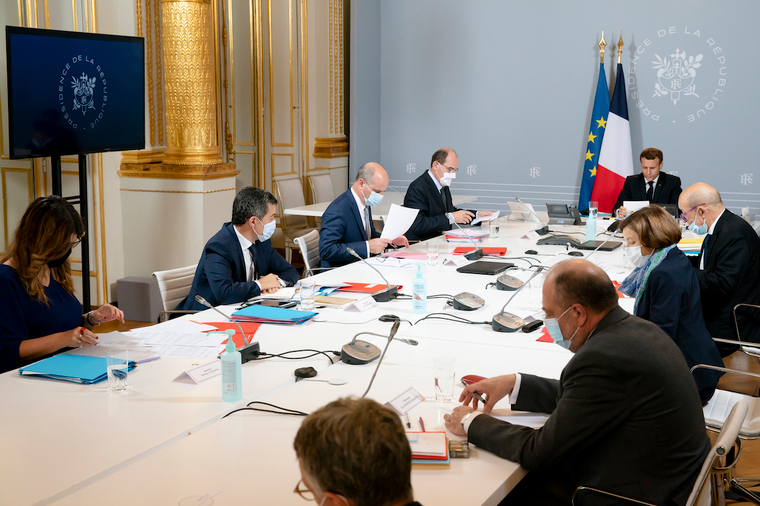The Defence and National Security Council is a French specificity. It is a select Council of Ministers, chaired each week by the President of the Republic, to coordinate defence and national security policy.
The National Defence Council first appeared in 1906 and took on various forms in the 20th century. Its existence was enshrined by Article 15 of the 1958 Constitution, which provides that the President of the Republic, Commander-in-Chief of the Armed Forces, chairs higher national defence council and committee meetings. A Decree in December 2019 expanded its role: renamed Defence and National Security Councils, they would now establish not only guidelines for military programming, overseas operations, deterrence and intelligence, but also address internal security, economic and energy issues and respond to major crises.
Initially taking place a few times a year, the Defence and National Security Council has met weekly since the terrorist attack in Nice of 14 July 2016 in order to better respond to the terrorist threat.

Who are the participants?
When it meets in plenary formation, the Defence and National Security Council includes the President of the Republic, the Prime Minister, the Minister for the Armed Forces, the Minister of the Interior, the Minister of the Economy, Finance and the Recovery, the Minister Delegate for Public Accounts, the Minister of Foreign Affairs, and other ministers concerned with issues on the agenda.
The Defence and National Security Council is assisted by the General Secretariat for Defence and National Security (SGDSN), which prepares the documents provided. The PR may moreover decide to invite any competent person to take part in a Defence and National Security Council meeting. The participants are bound by defence secrecy.
Council meetings are sometimes focused on a particular issue:
- Ecological Defence Council;
- Public Health Defence Council.
There are also two specialized formations within the Defence and National Security Council:
- The National Intelligence Council, which includes the President of the Republic, the Prime Minister, and ministers and directors of intelligence services and the National Intelligence and Counter-Terrorism Coordinator:.
- The Nuclear Armaments Council, which includes the President of the Republic, the Prime Minister, the Minister for the Armed Forces, the Armed Forces Chief of Staff, the Delegate General of Armaments, and the Director of the Military Applications Directorate at the Alternative Energies and Atomic Energy Commission (CEA).
Updated : 14 December 2022